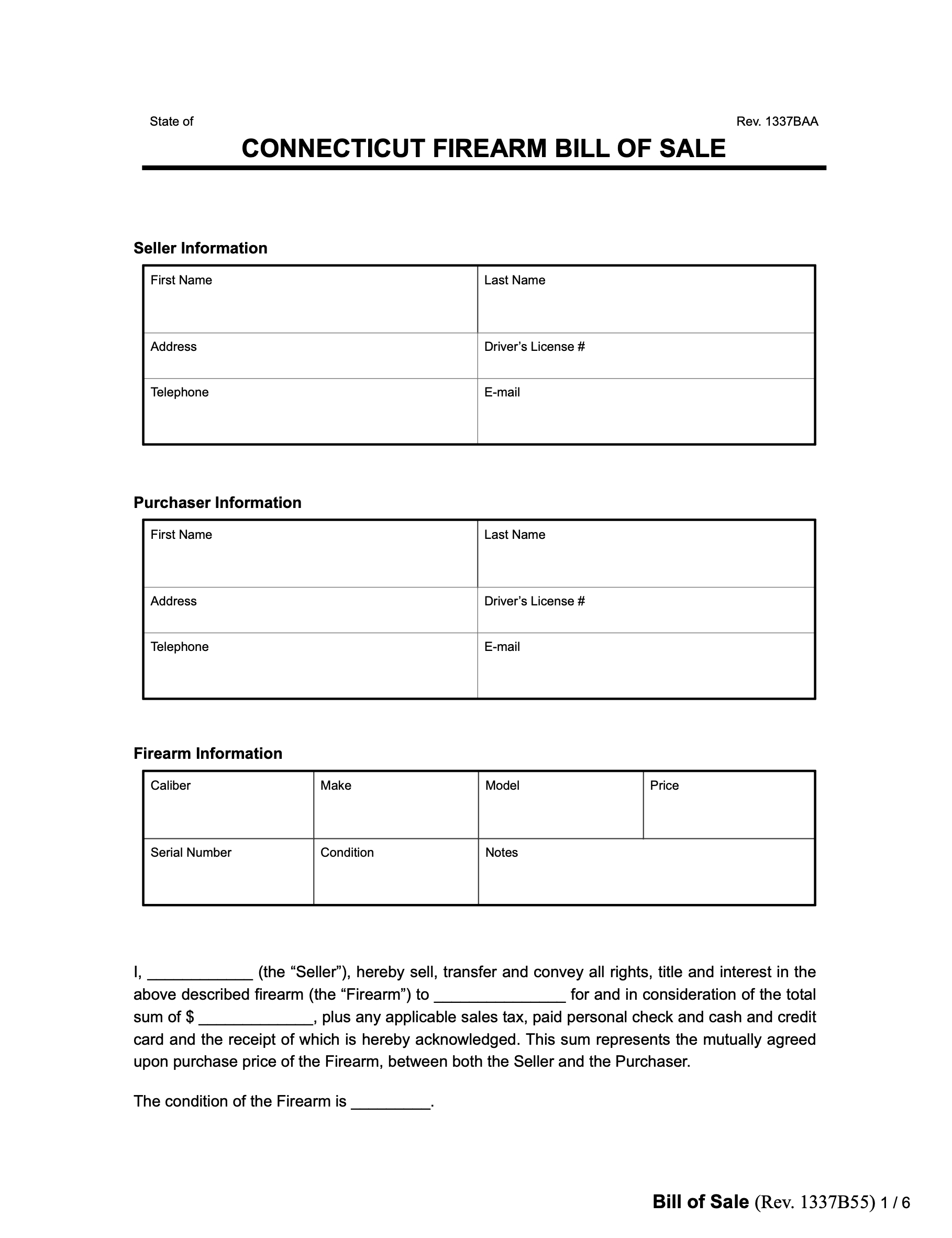A Connecticut firearm bill of sale is a document that sellers and buyers sign to transfer firearm ownership.
Connecticut does not require a waiting period to buy a firearm. However, due to the background check requirement, securing the correct permit and completing the pre-purchase forms may take time.
State Laws for Selling a Gun in Connecticut
Minimum Age to Purchase
You must be at least 21 to purchase handguns and at least 18 to buy rifles and long guns.
Permit for Purchase
Every person buying a firearm in the state must have a valid permit. You must pass the required criminal background check that the state police conduct to secure a firearm permit.
Register a Gun
You must go through the state police to buy any firearm, which also requires the submission of a firearm bill of sale.
The Special Licensing and Firearms Unit also maintains a registry for owners of assault weapons and machine guns. The unit manages and regulates the required documentation and necessary permits or licenses for all firearm sales transactions. They also maintain the sales records, giving them a form of ownership.
Assault weapons must be registered. [1] All licensed firearms vendors must maintain records of transactions. [2]
Open Carry Permit
Open carry of handguns and long guns is generally prohibited in Connecticut, except on property owned or legally controlled by the individual, at shooting ranges, or while hunting.
Concealed Carry Permit
Connecticut requires a permit to carry a pistol or revolver in public. [3] A permit is not necessary to have a firearm at home or in your place of business. The rule does not apply to long guns; active duty military and law enforcement are exempt.
Permits are valid for five years, and the state police issue them. A fee payment and background check are required to secure the permit. You also must supply proof that you have completed a firearm safety course.
How to Apply
Follow the steps below to apply for a concealed carry permit:
- Step 1 – Get Trained: Complete a gun safety training course. [4]
- Step 2 – Submit Permit Application: Complete and submit a State Permit to Carry Pistols and Revolvers from a Pistol Permit location. [5]
- Step 3 – Pay Fee: You must submit a $70 application fee.
- Step 4 – Pass Background Check: Applicants must pass a background check before receiving a permit.
- Step 5 – Wait for Approval or Denial: Your issuing authority will approve or deny your application within eight weeks of receiving it.
Gun Reciprocity
Connecticut requires anyone entering the state to get a permit to carry a firearm. [6]
Visitors to the state with a valid permit in their home state can use their existing permit for specific purposes:
- Taking a handgun training course.
- Seeking repair services.
- Attending gun shows.
- Transporting a firearm through the state during travel.
Beyond these limited circumstances, Connecticut does not honor other states’ firearm permits.
Some other states do recognize a Connecticut firearm permit, including:
- Alaska
- Arizona
- Idaho
- Indiana
- Kentucky
- Michigan
- Missouri
- Montana
- Oklahoma
- South Dakota
- Tennessee
- Utah
- Vermont
Restrictions on Firearm Ownership
Connecticut law specifies that certain people are not eligible to own firearms. [7]
People to whom any of the following apply are ineligible:
- Criminal guilt based on mental illness
- An illegal or unlawful alien
- Subject to a restraining or protective order involving the use or threatened use of physical force against another person
- Residency in a mental hospital in the past 12 months
- Convicted of a felony or certain misdemeanors
Firearm Inheritance Laws
To inherit a firearm in Connecticut, you must go through the same process as you would when buying one. You need to have a valid permit or eligibility certificate.
If you do not meet the requirements to own a firearm, you must surrender it to the police (CT Gen Stat § 29-36k) or transfer it to an eligible party.

